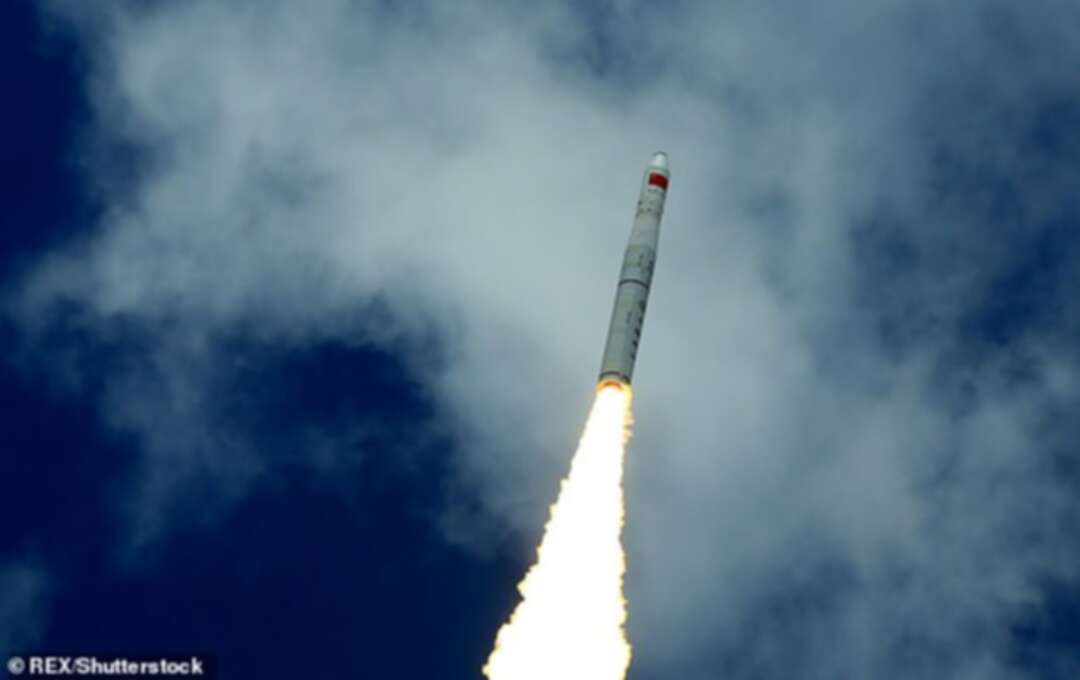-
China Plans to Send Fleet of Rockets into Space to Divert an Asteroid Away from Earth

According to the Daily Mail, experts at China’s National Space Science Centre have unveiled a plan to launch a fleet of rockets into space to practice diverting an asteroid away from Earth.
Their target is asteroid Bennu — a 1,614 feet (492 m) -wide spinning-top shaped body whose orbit will bring it within 7.5 million kilometres of Earth’s from 2175–2199.
At this time, the space rock will be classified as being potentially dangerous, with scientists having predicted it will have a 1-in-2,700 chance of hitting the Earth.
However, Chinese simulations suggest that the simultaneous impact of 23 'Long March 5' rockets, each some 900 tonnes, could knock Bennu 5,592 miles off course.
This is equal to 1.4 times the Earth's radius — and could be the difference between the asteroid sailing on by and slamming into Earth with devastating consequences.
Asteroid impacts pose a major threat to all life on Earth,' wrote paper author and space science engineer Mingtao Li of the National Space Science Center in Beijing.
'Deflecting an asteroid on an impact trajectory is critical to mitigating this threat.'
To knock an asteroid like Bennu off of its original course, a considerable amount of kinetic energy would be needed.
While using nuclear-powered explosions may seem the obvious choice for such an endeavour, this approach would come with the risk of the target breaking into separate chunks which could also end up on a collision course with the Earth.
However, Dr Li explained, it will be 'possible to defend against large asteroids with a nuclear-free technique within ten years.'
The approach proposed by the Chinese team would see multiple rockets strike the surface of Bennu at once — after spending some three years travelling from the Earth to reach the asteroid.
The effectiveness of each 'deflector' craft — dubbed an 'Assembled Kinetic Impactor' — would be improved by not separating from the rocket's upper stage, thereby providing extra mass to bear on the impact.
According to the team, the Long March 5 rocket would require minimal modifications — such as the addition of manoeuvring thrusters — in order to to be repurposed for an asteroid deflection mission.
The Long March 5 is the same rocket design that made an uncontrolled re-entry into Earth's atmosphere back in May this year.
Fortunately, the errant rocket craft ended up disintegrating safely over the Indian Ocean, causing no harm.
China is not the only power, however, making preparations to deflect asteroids that could potentially end up on a collision course with the Earth.
HAMMER — short for 'Hypervelocity Asteroid Mitigation Mission for Emergency Response' — is a US concept study to investigate the efficacy of using spacecraft as either a kinetic or nuclear impactor against an asteroid.
NASA simulations suggested that it might take 34–53 HAMMER strikes, all launched 10 years before Bennu and Earth were due to collide, to adequately deflect the asteroid onto a different course.
Were HAMMER to have 25 years lead time, however, such a figure could be reduced to only 7–11 individual launches.
Source: dailymail
Image source: REX/shutterstock- dailymail
You May Also Like
Popular Posts
Caricature
BENEFIT Sponsors BuildHer...
- April 23, 2025
BENEFIT, the Kingdom’s innovator and leading company in Fintech and electronic financial transactions service, has sponsored the BuildHer CityHack 2025 Hackathon, a two-day event spearheaded by the College of Engineering and Technology at the Royal University for Women (RUW).
Aimed at secondary school students, the event brought together a distinguished group of academic professionals and technology experts to mentor and inspire young participants.
More than 100 high school students from across the Kingdom of Bahrain took part in the hackathon, which featured an intensive programme of training workshops and hands-on sessions. These activities were tailored to enhance participants’ critical thinking, collaborative problem-solving, and team-building capabilities, while also encouraging the development of practical and sustainable solutions to contemporary challenges using modern technological tools.
BENEFIT’s Chief Executive Mr. Abdulwahed AlJanahi, commented: “Our support for this educational hackathon reflects our long-term strategic vision to nurture the talents of emerging national youth and empower the next generation of accomplished female leaders in technology. By fostering creativity and innovation, we aim to contribute meaningfully to Bahrain’s comprehensive development goals and align with the aspirations outlined in the Kingdom’s Vision 2030—an ambition in which BENEFIT plays a central role.”
Professor Riyadh Yousif Hamzah, President of the Royal University for Women, commented: “This initiative reflects our commitment to advancing women in STEM fields. We're cultivating a generation of creative, solution-driven female leaders who will drive national development. Our partnership with BENEFIT exemplifies the powerful synergy between academia and private sector in supporting educational innovation.”
Hanan Abdulla Hasan, Senior Manager, PR & Communication at BENEFIT, said: “We are honoured to collaborate with RUW in supporting this remarkable technology-focused event. It highlights our commitment to social responsibility, and our ongoing efforts to enhance the digital and innovation capabilities of young Bahraini women and foster their ability to harness technological tools in the service of a smarter, more sustainable future.”
For his part, Dr. Humam ElAgha, Acting Dean of the College of Engineering and Technology at the University, said: “BuildHer CityHack 2025 embodies our hands-on approach to education. By tackling real-world problems through creative thinking and sustainable solutions, we're preparing women to thrive in the knowledge economy – a cornerstone of the University's vision.”
opinion
Report
ads
Newsletter
Subscribe to our mailing list to get the new updates!






















